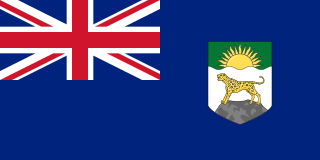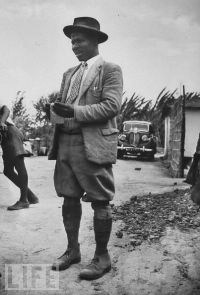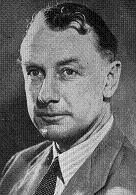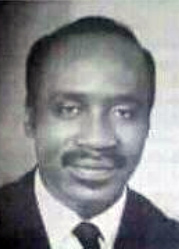Related Research Articles

Nyasaland was a British protectorate located in Africa that was established in 1907 when the former British Central Africa Protectorate changed its name. Between 1953 and 1963, Nyasaland was part of the Federation of Rhodesia and Nyasaland. After the Federation was dissolved, Nyasaland became independent from Britain on 6 July 1964 and was renamed Malawi.

Kanyama Chiume, born Murray William Kanyama Chiume, was a leading nationalist in the struggle for Malawi's independence in the 1950s and 1960s. He was also one of the leaders of the Nyasaland African Congress and served as the Minister of Education and the Minister for Foreign Affairs in the 1960s before fleeing the country after the 1964 Cabinet Crisis.
The Nyasaland African Congress (NAC) was an organisation that evolved into a political party in Nyasaland during the colonial period. The NAC was suppressed in 1959, but was succeeded in 1960 by the Malawi Congress Party, which went to on decisively win the first universal suffrage elections in 1961, and to lead the country to independence as Malawi in 1964.
Dunduzu Kaluli Chisiza (8 August 1930 – 2 September 1962), also known as Gladstone Chisiza, was an African nationalist who was active in the independence movements in Rhodesia and Nyasaland, respectively present-day Zimbabwe and Malawi.
Henry Masauko Blasius Chipembere was a Malawian nationalist politician who played a significant role in bringing independence from colonial rule to his native country, formerly known as Nyasaland. From an early age Chipembere was a strong believer in natural justice and, on his return in 1954 from university in South Africa, he joined his country's independence struggle as a nationalist strategist and spokesman. In 1957, considering that the independence movement needed a strong leader similar to Kwame Nkrumah, and considering himself too young for this task, he joined with other young nationalists in inviting Hastings Kamuzu Banda to return to Nyasaland as the movement's leader.

James Frederick Sangala was a founding member of the Nyasaland African Congress during the period of British colonial rule. Sangala was given the nickname "Pyagusi", which means "one who perseveres".

Sir Robert Perceval Armitage was a British colonial administrator who held senior positions in Kenya and the Gold Coast, and was Governor of Cyprus and then of Nyasaland during the period of decolonisation.
The Devlin Commission, officially the Nyasaland Commission of Inquiry, was a Commission of Inquiry set up in 1959 under the chairmanship of Mr.Justice Devlin, later Lord Devlin, after African opposition to the Federation of Rhodesia and Nyasaland, particularly its farming and rural conservation policies, and demands for progress towards majority rule promoted by the Nyasaland African Congress under its leader Dr Hastings Banda led to widespread disturbances in Nyasaland and some deaths. A state of emergency was declared in March 1959; about 1,300 people, many of whom were members of the Nyasaland African Congress party, were detained without trial, over were 2,000 imprisoned for offences related to the emergency and the Congress itself was banned. During the State of Emergency and the week preceding it, a total of 51 people were killed by troops or the police. Although the four members of the Commission were members of The British Establishment, its findings were highly unfavourable to the Nyasaland Government.

The cabinet crisis of 1964 in Malawi occurred in August and September 1964 shortly after independence when, after an unresolved confrontation between the Prime Minister, Hastings Banda and the cabinet ministers present on 26 August 1964, three ministers and a parliamentary secretary were dismissed on 7 September. These dismissals were followed by the resignations of three more cabinet ministers and another parliamentary secretary, in sympathy with those dismissed. Initially, this only left the President and one other minister in post, although one of those who had resigned rescinded his resignation within a few hours. The reasons that the ex-ministers put forward for the confrontation and subsequent resignations were the autocratic attitude of Banda, who failed to consult other ministers and kept power in his own hands, his insistence on maintaining diplomatic relations with South Africa and Portugal and a number of domestic austerity measures. It is unclear whether the former ministers intended to remove Banda entirely, to reduce his role to that of a non-executive figurehead or simply to force him to recognise collective cabinet responsibility. Banda seized the initiative, firstly, by dismissing some of the dissidents rather than negotiating, and secondly, by holding a debate on a motion of confidence on 8 and 9 September 1964. As the result of the debate was an overwhelming vote of confidence, Banda declined to reinstate any of the ministers or offer them any other posts, despite the urging of the Governor-General to compromise. After some unrest, and clashes between supporters of the ex-ministers and of Banda, most of the former left Malawi in October with their families and leading supporters, for Zambia or Tanzania. One ex-minister, Henry Chipembere went into hiding inside Malawi and, in February 1965 led a small, unsuccessful armed uprising. After its failure, he was able to arrange for his transfer to the USA. Another ex-minister, Yatuta Chisiza, organised an even smaller incursion from Mozambique in 1967, in which he was killed. Several of the former ministers died in exile or, in the case of Orton Chirwa in a Malawian jail, but some survived to return to Malawi after Banda was deposed and to return to public life.
Augustine Bwanausi was born in Malawi, then called Nyasaland, in 1930 and trained as a science teacher, but was also politically active in the Nyasaland African Congress, campaigning for the end of colonial rule. In March 1959, a State of Emergency was declared, and Bwanausi was arrested as a leading Congress member and detained until 1960. On his release, he joined the Malawi Congress Party and in 1961 was elected to the Legislative Council, becoming Minister of Internal Affairs and Development in the same year. In 1963, he became Minister of Works. In 1964, there was a confrontation between Banda and most of his ministers, which led to the sacking of Bwanausi and two of his cabinet colleagues in September 1964. Three other cabinet ministers resigned in sympathy, and although Banda was willingness to re-instate Bwanausi and one or two other ministers, their insistence on all be reinstated ended any hope of a reconciliation. In October 1964, Bwanausi left Malawi for Zambia, where he resumed teaching, and was active in Malawian exile politics until his death in a car accident in 1968.
Willie Chokani, who was born in Malawi, then called Nyasaland, in 1930, and had a variety of careers; as a teacher, a politician and a diplomat. He has also spent time in prison and was exiled from Malawi for almost 30 years after a confrontation with Hastings Banda, the first Prime Minister of the independent Malawi, in 1964. Chokani received a secondary education, which enabled him to attend university in Delhi and obtain teaching qualifications. He returned to Nyasaland in 1957 to become the first African headmaster in the protectorate, and was also politically active in the Nyasaland African Congress, campaigning for the end of colonial rule. In March 1959, a State of emergency was declared, and Chokani was arrested as a leading Congress member and detained until 1960. On his release, he joined the Malawi Congress Party and in 1961 was elected to the Legislative Council, becoming Minister of Labour in 1962. In 1964, there was a confrontation between Banda and most of his ministers, which led to the sacking of three cabinet members in September 1964. Chokani and two other cabinet ministers resigned in sympathy, and although Banda was willingness to re-instate Chokani and one or two other ministers, their insistence on all be reinstated ended any hope of a reconciliation. Chokani left Malawi for Zambia, where he resumed teaching, and was active in Malawian exile politics. He returned to Malawi in 1993, and in 1994 became Malawi's ambassador to the USA, later holding other diplomatic posts until his retirement. .

Albert Andrew Muwalo Gandale Nqumayo was a prominent politician in Malawi from the 1960s until he was sacked in 1976 and was executed in 1977. He entered politics in the mid 1950s through involvement in a hospital worker's trade union and membership of the Nyasaland African Congress, where his activities led to his detention without trial during the 1959 State of Emergency in Nyasaland. After his release, he joined the Malawi Congress Party (MCP), and became locally prominent in Ntcheu District as district MCP chairman and from 1962 as Member of Parliament for Ntcheu South. In 1963, he became Administrative Secretary of the MCP, and he was a prominent supporter of the then-Prime Minister, Hastings Banda during the Cabinet Crisis of 1964. Muwalo was rewarded for his loyalty with the cabinet post of Minister of Information in 1964, and in 1966 he became Minister of State in the President's Office. His close contact with Banda, both as minister in Banda's office and in the MCP gave him great power and, during the first half of the 1970s he and his relative, the Head of the Police Special Branch Focus Gwede, were heavily involved in the political repression of actual or suspected opponents of the Banda regime. In 1976 he and Gwede were arrested: the reasons for their arrests were unclear, but may have resulted from a power struggle among those around the ageing president or simply because he became too powerful and may have been seen by Banda as a threat. In 1977, the two were tried before a Traditional Court and after a trial whose fairness was in serious doubt, were both sentenced to death. Gwede was reprieved, but Muwalo was hanged on 3 September 1977.
LaurenceMakata, (1916–1962), was a businessman influential in the Nyasaland independence movement in the 1950s and 1960s.
Operation Sunrise was the name given to a police and military action conducted by the authorities in the Central African protectorate of Nyasaland which started on 3 March 1959, initially to detain and intern 350 individuals who were considered a potential threat to law and order in anticipation of the declaration of a State of Emergency. Although it is sometimes considered to involve only the incidents of 3 March, the Devlin Commission report is clear that it was one of two distinct operations by the security forces, reinforced from outside Nyasaland, involving the arrest and detention members of the Nyasaland African Congress. It involved not only those members of Congress initially arrested, but others arrested and detained without trial in the course of the emergency. The operation was described in some detail in the Devlin Commission report and that account has been amplified by Colonial Office documents not made available to the Devlin Commission.
The Southworth Commission was a Commission of inquiry appointed by the governor of the British Nyasaland Protectorate to investigate allegations of police brutality against demonstrators protesting against the State of Emergency that the governor had declared in February 1959. The demonstration took place during the visit of the British Prime Minister, Harold Macmillan to Blantyre in January 1960 as part of his African tour, and was witnessed by British and other journalists, some of whom made allegations against senior European police officers. The inquiry cleared the police of brutality but went beyond its terms of reference by heavily criticising several British correspondents for distorting events.
William H J Rangeley (1910-1958) was an officer in the colonial administration of Nyasaland and a scholar of the oral history and ethnography of the peoples of what is now Malawi.
The Nyasaland emergency of 1959 was a state of emergency in the protectorate of Nyasaland, which was declared by its governor, Sir Robert Armitage, on 3 March 1959 and which ended on 16 June 1960. Under the emergency powers that operated during the Emergency, over 1,300 members or supporters of the Nyasaland African Congress (Congress) were detained without trial, and most of the party's leaders including its president, Dr. Hastings Banda, were imprisoned in Southern Rhodesia after being arrested on 3 March. Many other Africans were jailed for offences related to the Emergency, including rioting and criminal damage. In the week before the Emergency was declared and during its first month, over 50 Africans were killed and many more wounded by the colonial security forces, which included many European troops from Southern Rhodesia. Others were beaten by troops or armed police or had their huts destroyed and their property seized during punitive operations undertaken during the Emergency.
Leroy Vail whose birth name was Hazen Leroy Vail, was an American specialist in African studies and educator who specialized in the history and linguistics of Central Africa and later extended his interests to Southern Africa. He taught in universities in Malawi, Zambia and the United States and his research in the first two countries inclined him toward the view that Central Africa underwent a period of underdevelopment that began in the mid-19th century and accelerated under colonial rule. After his return to the United States, he cooperated with Landeg White on studies of colonial Mozambique and on the value of African poetry and songs as a source of oral history.
Michael Hill Blackwood CBE was a lawyer and politician who spent most of his working life in colonial Nyasaland and in Malawi in the early years of its independence. Although he represented the interests of European settlers before independence and opposed both the transfer of power to the African majority and the break-up of the Federation of Rhodesia and Nyasaland, he remained in the country as a member of its legislature after Malawi’s independence and until his retirement on 1983.
Richard Wildman Kettlewell (1910–1994) was a colonial agricultural officer who spent all his colonial career in Nyasaland apart from three years of wartime army service. He became Director of Agriculture in 1951 and Secretary for National Resources then Minister of Lands and Surveys between 1960 and 1962. He was influential in the late colonial administration of Nyasaland, and responsible for the introduction of several controversial agricultural and land-use policies that were highly unpopular with African farmers and which he accepted had promoted nationalist sentiments in the protectorate. After leaving Nyasaland in 1962 shortly before its independence, he settled in the Cotswolds for the remainder of his life and undertook part-time consulting work on tropical land use.
References
- ↑ McCracken (2002), p. 78
- ↑ Kalinga (2012), p. 330
- ↑ McCracken (2002), p. 78
- ↑ Kalinga (2010), p. 750
- ↑ Kalinga (2012), pp. 329-30
- ↑ Kalinga (2010), p. 750
- ↑ McCracken (2002), p. 78
- ↑ McCracken (2002), p. 78
- ↑ McCracken (2002), pp. 71-2
- ↑ Groves (2013), p. 164
- ↑ McCracken (2002), pp. 73-4
- ↑ Kalinga (2010), p. 747
- ↑ McCracken (2002), pp. 74-6
- ↑ McCracken (2002), pp. 73-4
- ↑ McCracken (2012), pp. 346-8.
- ↑ Kalinga (2010), p. 752
- ↑ McCracken (2002), p. 79
- ↑ McCracken (2012), pp. 350-2.
- ↑ Kalinga (2010), pp. 744, 754
- ↑ McCracken (2002), p. 78
- ↑ Kalinga (2010), p. 754
- ↑ McCracken (2012), pp. 355–6.
- ↑ McCracken (2012), pp. 356, 358–9.
- ↑ McCracken (2002), pp. 79-80
- ↑ McCracken (2002), p. 81
- ↑ McCracken (2002), p. 81.
- ↑ Kalinga (2002), p. 81
- ↑ Kalinga (2012), p. 330
- ↑ McCracken (2002), pp. 85-6
- ↑ McCracken (2002), p. 87
- ↑ Kalinga (2012), p. 330
- ↑ Kalinga (2012), p. 330